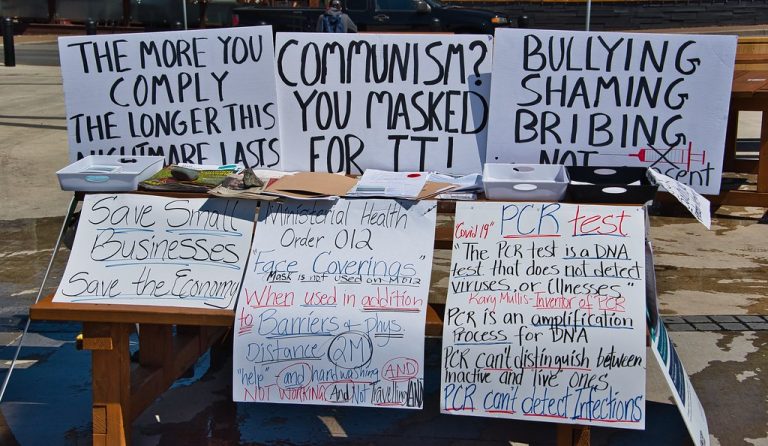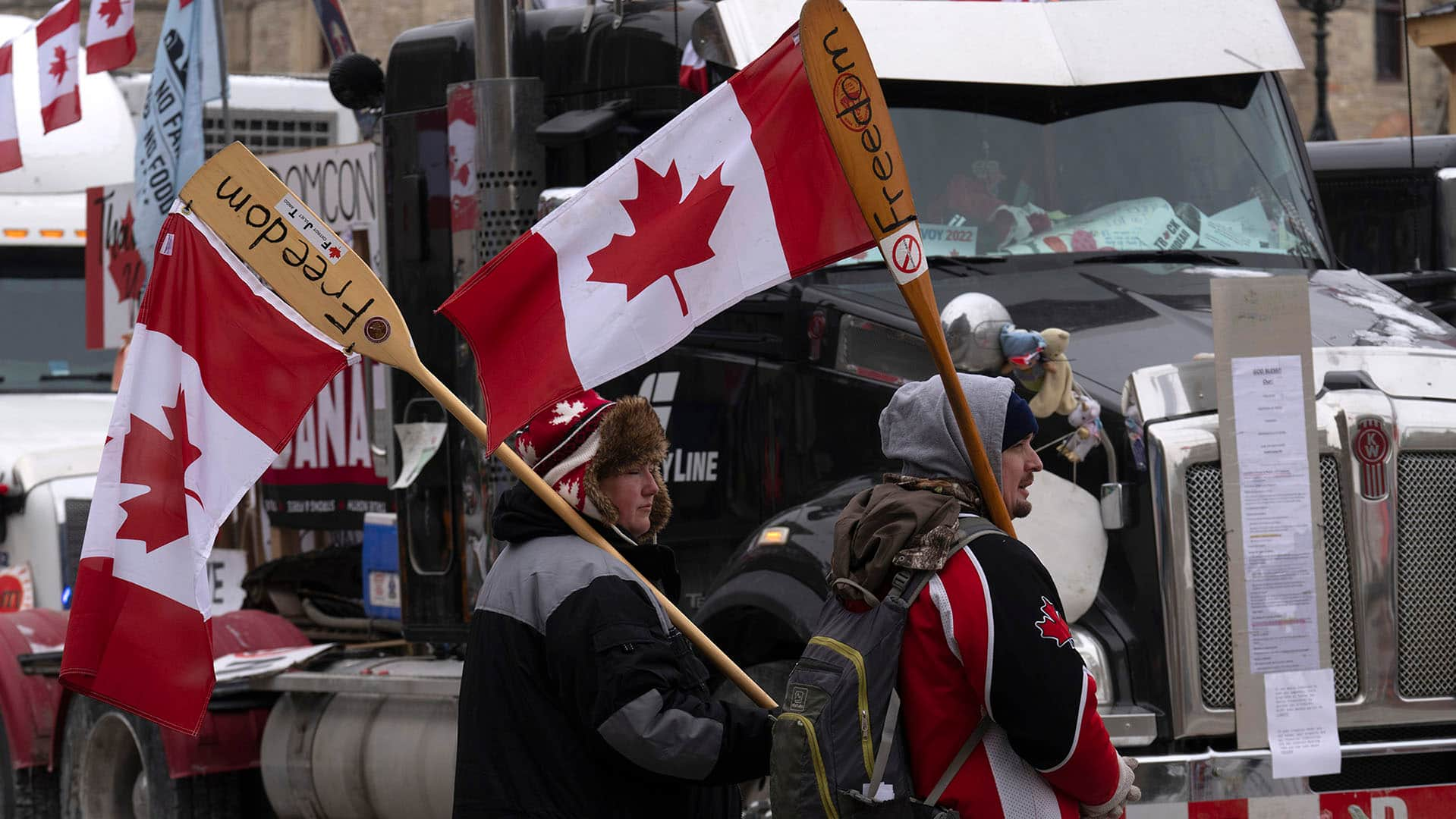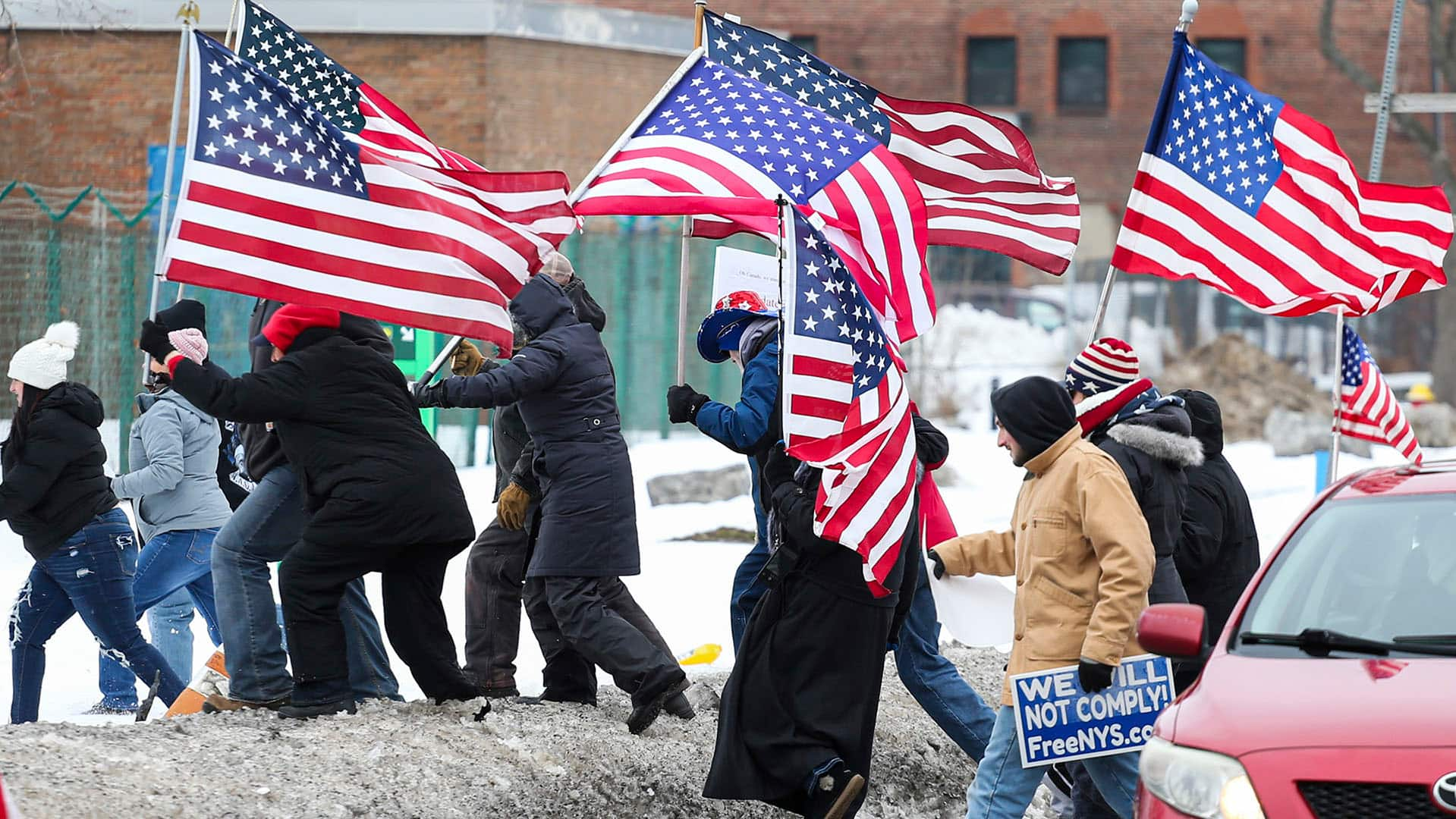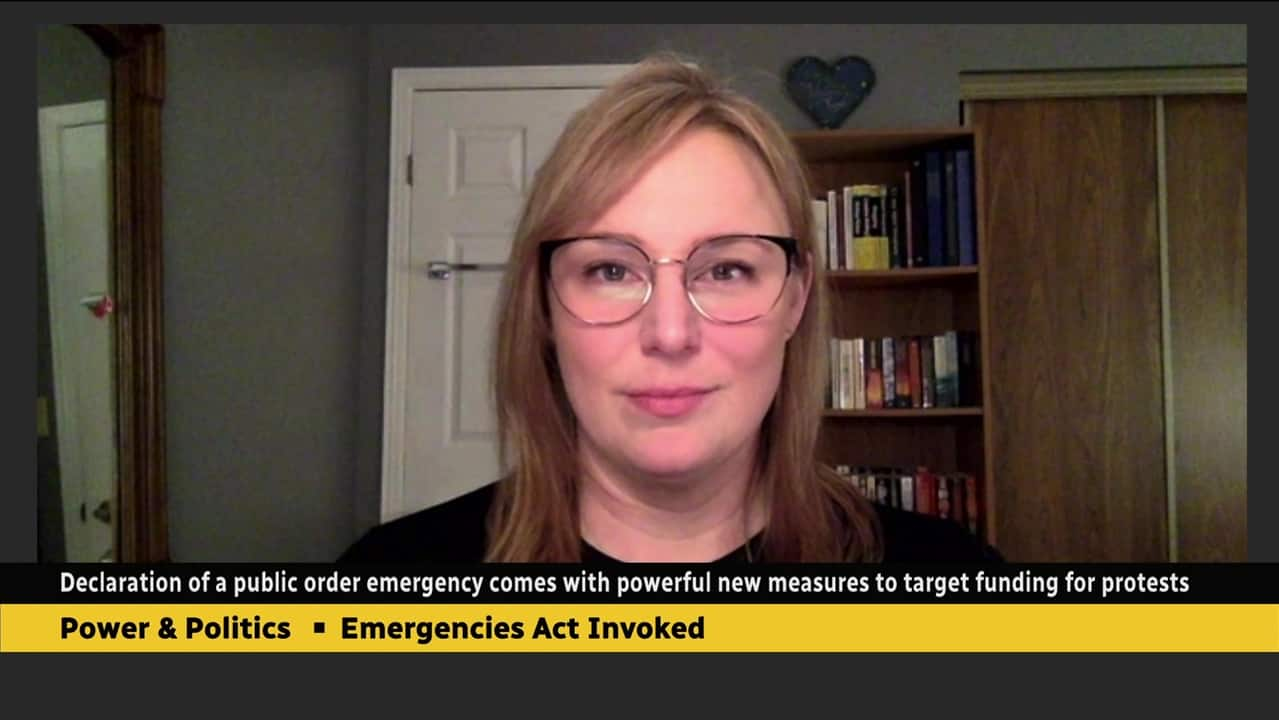
A police officer looks for a place to leave a notice as they tour the protest area in Ottawa on Wednesday. Public Safety Minister Marco Mendicino said at a recent news conference that the blockades are ‘driven by an ideology to overthrow the government’ and there are elements within them that pose a serious threat to safety. (Adrian Wyld/The Canadian Press)118 comments
Using powers granted under the Emergencies Act, the federal government has directed banks and other financial institutions to stop doing business with people associated with the anti-vaccine mandate convoy occupying the nation’s capital.
According to the regulations published late Tuesday, financial institutions are required to monitor and halt all transactions that funnel money to demonstrators — a measure designed to cut off funding to a well-financed protest that has taken over large swaths of Ottawa’s downtown core.
What new powers do the banks have under the Emergencies Act?
The government’s new directive, called the “emergency economic measures order,” goes beyond asking banks to simply stop transferring funds to protest organizers. The government wants banks to stop doing business with some people altogether.
The order says that banks and other financial entities (like credit unions, co-ops, loan companies, trusts and cryptocurrency platforms) must stop “providing any financial or related services” to people associated with the protests — a move that will result in frozen accounts, stranded money and cancelled credit cards.WATCH | Ottawa protesters could face financial consequences:

The potential financial consequences for protesters in Ottawa
1 day agoDuration3:27The Emergencies Act gives authorities the power to freeze the finances of those connected to blockades and protests, and the consequences could last long after the demonstrations end. 3:27
The government is also ordering insurance companies to suspend policies on vehicles that are part of an unlawful “public assembly.”
These financial institutions can’t handle cash, issue a loan, extend a mortgage or more generally facilitate “any transaction” of a “designated person” while the Emergencies Act is in place.
The regulations define a “designated person” who can be cut off from financial services as someone who is “directly or indirectly” participating in a “public assembly that may reasonably be expected to lead to a breach of the peace,” or a person engaging in “serious interference with trade” or “critical infrastructure.”
Banks also are required to “disclose without delay” the “existence of property in their possession or control” or “any information about a transaction or proposed transaction” related to a “designated person” to both the RCMP and the Canadian Security Intelligence Service (CSIS).
“Those authorities are now in force and they’re being used,” said Public Safety Minister Marco Mendicino. “It’s incredibly important that we follow the money.”
What does this mean for convoy donors?
There are questions about how widely this policy will be applied — whether, for example, the thousands of donors to the GoFundMe and GiveSendGo fundraising campaigns in support of this anti-mandate movement are also considered “designated persons” under the law.
The regulation’s definition of a “designated person” also includes people who “provide property to facilitate or participate in any assembly.” In other words, under these regulations, anyone sending funds to support these protests could be facing a shaky financial future.
A senior government official, speaking to reporters at a technical briefing on the Emergencies Act, said these measures are designed to target “key sources of funding.”WATCH | Convoy donations raise concern about foreign funding of political activity:

More than half of convoy donations came from U.S., hacked data shows
3 days agoDuration2:01A CBC News analysis of hacked data about those who donated to the protest convoys through GiveSendGo found more than half of the donations came from the U.S. It’s raising concern about foreign funding of political activity. 2:01
“The economic order does require financial service providers to do some due diligence around the property they own of entities and individuals involved in the illegal protests,” the official said.
“I think it makes sense to focus first on key issues and key sources of funding. I think that’s certainly the intent of the order — to ensure that funding is limited.”
The Emergencies Act and its associated regulations are in effect for only 30 days; that period could be shorter if Prime Minister Justin Trudeau and his cabinet revoke it or if Parliament scuttles it after a vote. But a senior government official said there could be long-term implications.
“For the most part, financial institutions can decide who they do business with and they may decide to cease offering financial services,” the official said.
Mark Blumberg is a lawyer at Blumberg Segal LLP who specializes in non-profit and charity law. In an interview, he said that while the Emergencies Act gives banks time-limited powers, these institutions “may just decide to shut the person’s account down” because there could be “huge risks” for banks servicing these customers in the future.
How will this ‘de-banking’ process play out?
Under the regulations, the banks have a “duty to determine” who among their customers is considered a “designated person” who should be denied financial services. The regulations stipulate it is up to the banks to “determine on a continuing basis whether they are in possession or control of property that is owned, held or controlled by or on behalf of a designated person.”
Banks will be working with law enforcement to decide who should be “de-banked.”
A senior government official said “information will flow back and forth” between the RCMP and the Financial Transactions and Reports Analysis Centre of Canada (FINTRAC), the government’s financial intelligence unit.
Police could gather the names and licence plate numbers of people participating in a protest or an unlawful assembly and share that information with FINTRAC, the official said.
A spokesperson for the Canadian Bankers Association, the industry group that represents 60 domestic and foreign banks, said its members will “follow all applicable laws and regulations” but it doesn’t anticipate too much disruption.
“All financial service providers, including banks, covered by the federal Emergencies Act will need to diligently implement the required measures, as stipulated by the government in the corresponding emergency economic measures order, which are not expected to impact the vast majority of customers,” the spokesperson said.WATCH | The potential impact of new financial rules:

Emergency financial measures won’t have an immediate impact on protests in Ottawa, says financing expert
2 days agoDuration5:31″Short term, freezing or seizing funds associated with the convoy isn’t likely to have an immediate impact,” said former CSIS senior strategic analyst Jessica Davis. “Over the medium term, I would say that this is probably more likely to put a lot of financial pressure on the people who are participating in the protest. They aren’t going to be able to do things like pay bills, pay their hotel bills – they will eventually run out of supplies as well.” 5:31
What impact could these measures have on the Ottawa occupation?
Jessica Davis, president of Insight Threat Intelligence and a former CSIS strategic analyst, said these measures are likely to put “a lot of financial pressure” on the people organizing this protest.
With access to bank accounts and credit cards and other financial instruments suspended, protesters won’t be able to pay for things like hotel and fuel bills and the costs associated with their street parties and other activities.
Because the organizers of this protest have been so public about their participation on social media, “banks won’t have a hard time identifying who these people are,” Davis said.
“These measures will have an immediate financial impact,” she said.
Over the longer term, Davis said, it may be hard for some of the truckers participating to ever find work again because they could lack the necessary insurance to operate a big rig.
“Paying bills, paying rent and any kind of day-to-day financial transaction can be stopped for people who are part of the protest movement,” she said.
There may also be some “unintended consequences” from frozen accounts, such as suspended alimony and child support payments, Davis said. “It’s going to be very difficult for them.”
While these measures might help to bust up a protest that has severely disrupted the nation’s capital, Davis said they could also further “radicalize” a group that is already concerned about government overreach.
“This will further entrench their ideas and their mindset,” she said.
Are there any legal implications for the banks?
Banks have been granted immunity against legal action in the event of disputes over whether someone should have been denied financial services.
“No proceedings under the Emergencies Act and no civil proceedings lie against an entity for complying with this Order,” the regulations read.